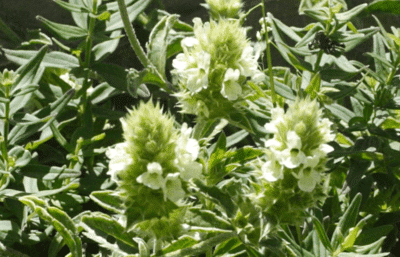The world of medicinal plants offers an almost endless selection of different species and varieties with diverse properties. One such plant genus is Sideritis, also known as mountain tea. Sideritis is a group of plants native to the mountainous regions of Southern Europe, North Africa and the Near East. The various Sideritis species have a long history of use in folk medicine and offer a wealth of health benefits. Let's delve into the fascinating world of mountain tea and discover some of the best-known Sideritis species.
Here you can find our selection of Sideritis seeds!
- Sideritis scardicaSideritis scardica, also known as Bulgarian mountain tea, is a plant native to Bulgaria. Bulgarian mountain tea is characterized by its silver-grey leaves and yellowish flowers and has been used in traditional Bulgarian medicine for centuries. It contains a high concentration of essential oils, flavonoids and antioxidants, which have anti-inflammatory and soothing properties. Bulgarian mountain tea is often used to strengthen the immune system and treat cold symptoms.
Here you can find our Sideritis scardica seeds! - Sideritis raeseriSideritis raeseri, also known as Greek mountain tea, is one of the best known and most widespread species of sideritis. It grows in the high altitudes of the Greek mountain regions and is an integral part of Greek folk medicine. Greek mountain tea is characterized by its delicate, hairy leaves and yellowish flowers. It contains a variety of bioactive substances, such as flavonoids and essential oils, which have antioxidant, anti-inflammatory and antimicrobial properties. Greek mountain tea is often used to aid digestion, relieve stomach discomfort and detoxify.
- Sideritis clandestinaSideritis clandestina, also known as Spanish mountain tea, is a plant native to Spain. Spanish mountain tea is characterized by its silver-grey leaves and intensely fragrant small yellow flowers. It has been used for centuries in the Spanish tradition and has a wide range of health benefits. Spanish mountain tea contains essential oils, tannins, bitter substances and flavonoids, which have anti-inflammatory and antimicrobial effects. It is often used to relieve respiratory problems and strengthen the immune system.
- Sideritis syriacaSideritis syriaca, also known as Syrian mountain tea, is native to the regions of the eastern Mediterranean and the Middle East. Syrian mountain tea is characterized by its grey-green leaves and delicate purple flowers. It contains a high concentration of essential oils, flavonoids and antioxidants, which have antiviral, anti-inflammatory and analgesic properties. Syrian mountain tea is often used to relieve sore throats, headaches and to improve mood.
Here you can find our Sideritis syriaca seeds!
Sideritis species, collectively known as mountain tea, are plants with fascinating properties and a rich tradition in folk medicine. From Bulgaria to Greece to Spain and the Middle East, various Sideritis species offer a wide range of health benefits. From boosting the immune system to aiding digestion and relieving respiratory ailments, these plants have much to offer. However, it is important to note that a qualified expert should always be consulted before using mountain tea to treat medical problems.
Note: The information in this article is for informational purposes only and is not intended to replace the advice of a doctor or other healthcare professional. Always consult a doctor before using any new herbs or supplements, and always check that certain plants are legal in your country before growing them.











